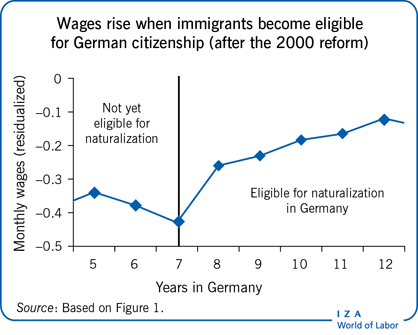Elevator pitch
The perceived lack of economic or social integration by immigrants in their host countries is a key concern in the public debate. Research shows that the option to naturalize has considerable economic and social benefits for eligible immigrants, even in countries with a tradition of restrictive policies. First-generation immigrants who naturalize have higher earnings and more stable jobs. Gains are particularly large for immigrants from poorer countries. Moreover, citizenship encourages additional investment in skills and enables immigrants to postpone marriage and fertility. A key question is: does naturalization promote successful integration or do only those immigrants most willing to integrate actually apply?

Key findings
Pros
Citizenship is associated with large and persistent wage gains.
The wage gains suggest that naturalized citizens “catch up” to natives with similar characteristics.
Wage gains are larger for immigrants from poorer countries; immigrants also invest more in skills, especially vocational education.
In Germany, women gain more than men do; and recent immigrants gain more from access to citizenship than traditional guest workers do.
With access to citizenship, immigrant women postpone marriage and fertility thus closing one-third of the immigrant–native gap in age of marriage and age at first birth.
Cons
Citizenship appears to have little effect on men’s employment and wages.
The propensity to naturalize is low in some European countries.
It is a challenge to separate whether naturalization causes success in the labor market or is taken up by those immigrants most likely to succeed anyway.